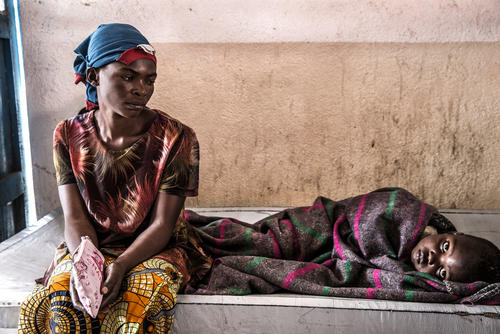Aline Kaendo knew how to keep her five-year-old son Aristide safe from cholera at home. Wash your hands, use clean toilets, drink only treated water, rinse your fruit and vegetables with clean water: Aline followed all this advice, but Aristide still fell ill.
“We treat the water at home because we can afford to buy the required product, but the children play in the lake, perhaps drink from it while they play, share food, and if they have bought it in the street it may not have been prepared hygienically,” Aline says. “They pick up fruit and eat it straight away – there are many ways in which my son could have become ill.”
Fortunately, Aline was able to seek treatment for her son at the cholera treatment centre (CTC) run by Médecins Sans Frontières (MSF) in Minova, in the eastern province of South Kivu in the Democratic Republic of Congo (DRC), where she lives.
Cholera is a water-borne bacterial infection transmitted through contact with bodily fluids or by consuming contaminated food or water. While it can affect anyone, the people most likely to catch it are the poorest of the poor; those who live in unsanitary conditions with no access to clean water. It can cause severe diarrhoea and vomiting, and rapidly prove fatal if not treated. However, cholera is very simple to treat – most patients respond well to oral rehydration salts, which are easy to administer. In more serious cases intravenous fluids are required, but ultimately no one should die of cholera.
In 2017, DRC experienced one of the worst outbreaks of cholera in 20 years, with all but two of its 26 provinces reporting cases. Around 55,000 people were reported having caught the disease and more than 1,000 died from it. By the end of December, MSF had treated half of the registered cases, but the epidemic was not completely over.
War-torn Yemen was also hit by a cholera outbreak of an unprecedented scale in 2017. It started in April and rapidly spread, affecting hundreds of thousands of people. By June, when the epidemic was at its peak, MSF staff were admitting more than 11,000 patients to CTCs across the country each week. In total, teams treated more than 100,000 people in 37 CTCs and oral rehydration points during the year.
More than three years of war had already taken a severe toll on the country and its infrastructure. Public health workers have not received their salaries for more than a year, so many have sought work elsewhere. High unemployment and rampant inflation mean that even where health facilities are still functioning, people cannot afford the transport costs to reach them. The cholera epidemic brought a crumbling healthcare system to the brink of collapse.
While war and a failing public health system contributed to an unprecedented outbreak in Yemen, drought, conflict, population displacement, and a lack of access to safe drinking water and sanitation contributed to other outbreaks across Africa. In addition to the large epidemic in DRC, MSF teams also responded to outbreaks of cholera in Nigeria, Chad, Kenya and South Sudan.
In Borno state in northeastern Nigeria, for example, overcrowding and unhygienic conditions in the camps for displaced people created the ideal breeding grounds for cholera. MSF teams responded to outbreaks between August and November, but insecurity is a major issue in this region, making the provision of healthcare extremely dangerous and complex for our teams. During the outbreak in Chad, MSF treated 1,000 patients and distributed hygiene kits containing sachets for treating water, 20-litre buckets, soap, blankets and mosquito nets. The team also ran activities to raise awareness of the disease and explain how to prevent it.
In total in 2017, MSF staff treated 143,100 people for cholera in 13 countries, compared with 20,600 people in 2016. However, our response could have been more effective, if we, and other aid organisations, had been able to respond more quickly and implement the full range of tools that we now have at our disposal. In countries across the Horn of Africa, a lack of resources – such as adequately staffed hospitals, health promotion and awareness-raising activities, and clean water – hampered the response.
Due to security issues and our other major interventions in Yemen, our staff responded to outbreaks mainly in the areas where they were already running projects. But the needs were much larger. While we provided lifesaving care, and water and sanitation services to ensure clean water, vaccines were not available to carry out emergency cholera vaccination campaigns in hotspot areas – an effective major component of a response to an outbreak.
We know from previous experience and scientific evidence that a one-dose oral cholera vaccine strategy is not only safe and easy to implement; it can also prevent or reduce the transmission of the disease during an epidemic. This strategy was not used in Yemen, or many other places that experienced outbreaks.
Our challenge going forward is to respond to future outbreaks swiftly and to the right scale, implementing the best strategy and existing tools. We should no longer see deaths from cholera – we have the measures, the tools and the means to prevent and treat the disease.

















